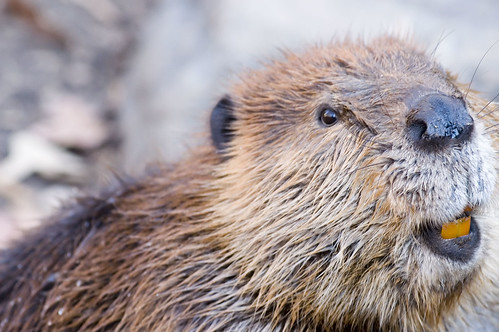beaver /BEE-vər/. noun or verb. A large, amphibious rodent. To work industriously and eagerly at something.
My mother is a deeply committed murophobic: rodents of all kinds inspire implausible dashes and acrobatic leaps onto chairs…she even has to turn away from the cartoon variety Minnies and Mickeys and Chips and Dales when they appear on screen. So I took no joy in discovering, and immediately sharing to her chagrin and the immediate obsolescence of her fur apparel—that the beaver, that tundra-destroying critter, is in fact a rodent. Not the largest and thus most terrifying rodent—that distinction belongs to the gregarious, community dwelling, capybara, which can grow up to 150 pounds—but one that had quietly found its way past her rodentea defenses.
Generally, though, most of us know quite a bit about beavers because they are commonplace in our lives, in reality and cartoons and in phrases such as being an “eager beaver” or “beavering away” at something. We owe that ubiquity to the beaver’s once astonishing numbers. Peaking at, by some estimates, nearly 90 million in North America, the early European expansion into Canada was driven by beaver hunting. Beavers were valued not only for their fur—the term “made beaver” was used as a unit of currency in the the way “buck” for buck-skin would be used later, but also for the castoreum (or castor oil) found in the beaver’s castor sacks, used to treat constipation, inflammation and hysteria, and even for their testicles, which were commonly dried and used for various medicinal purposes.
Lesser known is that the common method of trapping beaver, which involved an underwater trap and a stick that, if found floating, indicated the intended prey had absconded with the trap, was the source of the then-common phrase “that’s the way the stick floats,” the earliest known use of a pattern familiar to us now in pitilessly ambivalent sayings like “that’s the way the ball bounces”, the cookie crumbles, the mop flops and the burger burns.
The word “beaver” itself comes in a direct line from the Proto-Indo-European root bher-, meaning “bright or brown,” a root also found in modern words as various (and sometimes not) as bear, burnish, berserk and brunette.
And of course, the word has more meanings as well. Other readers of Hamlet might also once have been mystified by its appearance in an early exchange there in which Hamlet asks Horatio about what turns out to be his father’s ghost, “saw you not his face?” and Horatio replies, “O, yes, my lord, he wore his beaver up.” I know now that the “beaver” Horatio was referring to was the face face guard on a helmet, the guard that could be lifted to more easily talk, drink and, in this case, reveal who goes there. The fact that at the time I didn’t have even a far-fetched, juvenile explanation for the word reveals more about the kind of 13-year old word nerd I was than I might like.
On that note, keeping in mind the physical mechanism of the helmet’s beaver, a piece of armor worn by predominantly bearded men, and observing also that beaver was slang for the beard itself, I leave it solely to the listener’s imagination, and discretion, to perform a little etymological reconstruction of the origins of the one common slang use I’ve diligently avoided here.
Links & Meanders
On “Beaver,” the beard game: The Spectator and Bookride.
On the (seriously) not dirty headline, “Hooker Overcomes Illness, Slaps Beaver”.
Notes & Quotes
“Carrefax, listen: things have changed since I was last here.” ¶ “Too damn right they have! When you were last here I was beavering away at wireless, only to get pipped at the post…”
—Tom McCarthy
—from C
“Economic even more than linguistic obstacles impede any programme of spelling reform. The cost of republishing all extant literature in any such spelling would be prohibitive. And that of banishing millions of literate people from the existing community of English-readers – for nothing else would be entailed by any selective plan – is not to be reckoned fiscally. ¶ No. It is more realistic, more merciful and finally more blessed to keep on beavering away with I before E except after C (if they still teach that) and resigning oneself to the prospect that some people will always be better spellers than others.”
—Kingsley Amis
—from The King’s English





Leave a Reply